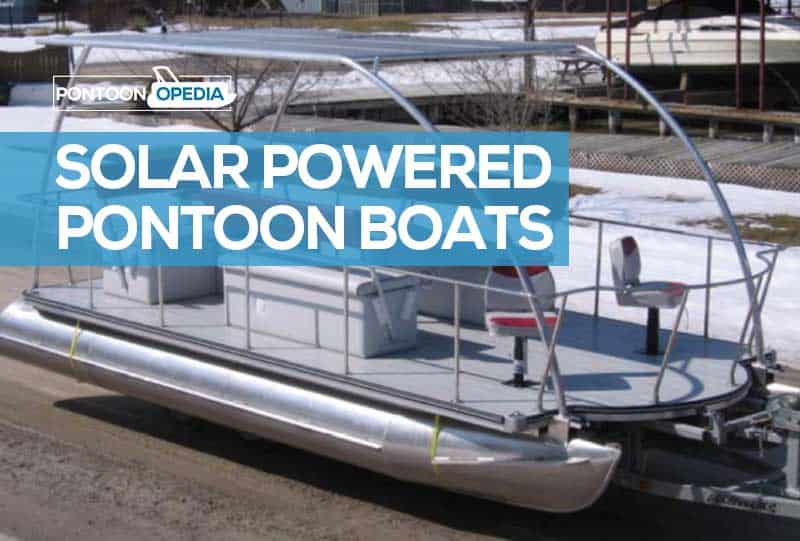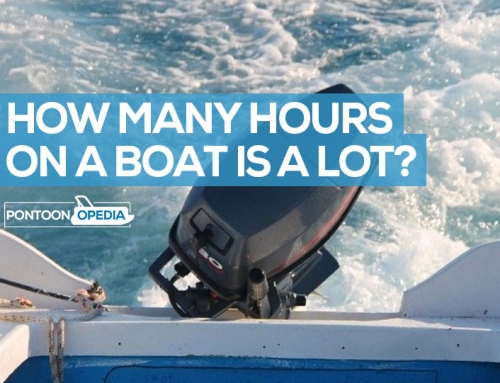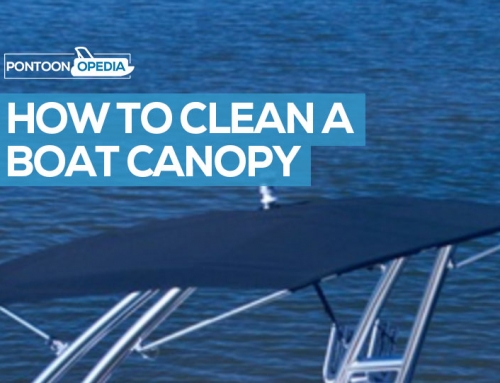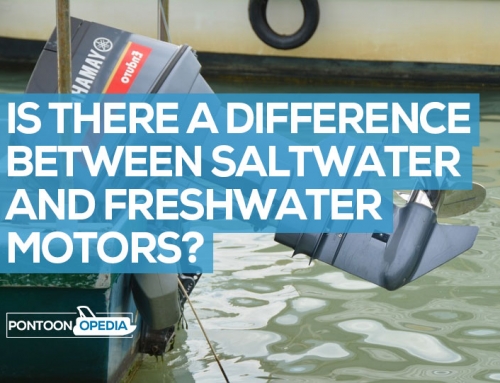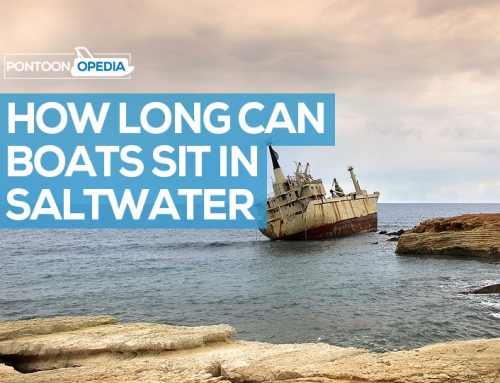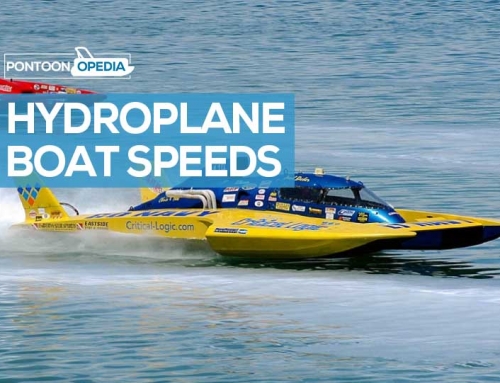The other day one of my pontoon buddies asked me what I knew about solar powered pontoon boats. At that point I couldn’t tell him too much, as I’d never really seen one, or checked any out at trade shows. This needed to change!
As a result, I spent all of last week researching as much as I could into them, including how solar pontoon boats work, why you would own one, what solar pontoon boat kits are like, and more.
Below is my solar powered pontoon boat introduction and guide which answer every conceivable question you have about them.
What is a solar powered pontoon boat?
It’s the same as a traditional pontoon boat from a design perspective; open deck space, flat bottom, pontoon tubes, and so on but with some key differences relating to power.
In simple terms, you will have solar panels, batteries and even an electric motor giving you a solar pontoon boat.
Just like standard pontoons, these boats are ideal for leisure, fishing and perfect for cruising around on a lazy Sunday! Albeit in a far more economical and ecological manner – for example, did you know how much gas a pontoon boat uses ?!?
How do solar pontoon boats work?
Just like any device that use solar energy, a solar pontoon boat harnesses the energy from the sun and converts it into energy that is stored in batteries and can then be used onboard.
Your solar power set-up or kit can have a variety of components and accessories. It’s actually possible to really customise it for your needs.
You can buy solar pontoon boat kits on Amazon. The one I have found with the best reviews is this one here (view Amazon prices). It comes with mount brackets, battery charger, solar panels, and the cable connectivity kits.
However, here are the main components you need for your solar system on a pontoon boat:
- Solar Panels
- Mounts
- Battery
- Motor
- Control Charger
Let’s get into each one of those components in more detail so you can understand better how they would work. This is particularly relevant if you are thinking about getting one of those solar pontoon boat kits.
Solar panels
This is the first component that collects the energy from the sun’s rays as is probably the most recognizable.
The solar panels you need should be flexible and waterproof to ensure they are going to be able to withstand the elements they are going to be exposed to.
You can have a single panel or multiple panels, that is up to your discretion (how many you can afford, how much space you have). However, it is worth noting the more panels you have, the more energy you will be able to harness and store.
The most common location to place your solar panels is on the rooftop, it doesn’t matter if it is a hard or soft rood as the panels can just lie on top.
This is the optimal position for them as they are out of the way and in the best place to absorb the sunlight throughout the whole day.
Mounts
You need a method to hold your panels in place and this is where the mounts come in.
There are a variety of options available so you can place your panels anywhere you want to and ensure that they are secure.
The solar panel mounts will come with bolts, tools and a special glue to stick the panels into position.
Battery
Collecting all this energy via the panels is going to be pointless if you can’t store it and use it as you please to power your pontoon boat, so you are going to need a battery or two.
Depending on your requirements you may opt for more than one battery so you can store more energy, especially if your boat has a high electrical drain.
Make sure you use a marine battery so ensure that the salt and water aren’t going to be detrimental to it.
Handy Hint: Read my guide to replacing your pontoon boat batteries including what you need and what brands are doing the business right now.
Electric motor
If you are going to go completely solar, you are going to want an electric motor! Keep your motor as small as you can that is going to provide you with what you need. Here are just some of the benefits to using an electric motor on your pontoon boat:
- Quiet motor with less noise pollution.
- Clean and fuel-efficient propulsion.
- Cost savings on traditional fuel and even maintenance.
- No smelly exhaust fumes.
- Reduction in your carbon footprint.
- Less maintenance compared to a traditional motor.
Handy Hint: Read my guide to electric pontoon boats including how they work and the way the batteries and motor need to be harnessed.
The bigger the motor, the more power it is going to draw. Electric motors are great for cruising and trolling speeds.
However, if you want something that can give you power and speed on demand, you may want to avoid an electric motor.
Having said that, solar technology is constantly evolving, and I am certain that eventually electric motors that can give you that power and speed on demand will be available in the market.
Charge controller
When it comes to ensuring the life of your batteries and protecting them, you should make sure you have a charge controller in your system.
This will prevent the batteries from overcharging allowing them to stay at their peak capacity for a longer period of time.
Not only that, but it prevents you having to spend extra money on new batteries for your solar powered pontoon boat because you overcharged too often and killed its capacity to hold a charge.
Why buy solar pontoon boat kits?
Now that you have a generic understanding of what’s possible with a solar powered pontoon boat, let’s look a little deeper into the pros and cons of having one.
Pros
So, why should you consider the option of a solar powered pontoon boat, especially when a fuel system works so well? They actually come with many benefits which is why you may want to consider if you decide to go down this path.
Finances
A solar powered pontoon boat can actually save you money in the long run. You may have to invest a little bit of money up front if you are covering your boat to solar powered or buying one new, however, this is worth the investment.
There are huge savings on fuel that you won’t have to worry about with an electric engine. You should take advantage of the sun and save yourself some money.
You won’t have to take a detour to pick up some fuel on the way to the boat ramp, which again is going to save you money not only in fuel but wear of tires on your trailer and car.
Environment
Solar takes advantage of what mother nature, an inexhaustible energy source that allows us to minimize pollution.
Think about it? No fuel means no air pollution and no possibility of accidentally spilling fuel into the ocean.
Not only that, but you’re actually allowing the ecosystems beneath the water’s surface to flourish and thrive as you aren’t contaminating it.
Noise
Do you know what frustrates me more than anything being on a boat? The noise of the motor running, especially when you are trying to have a conversation!
When you go solar, you can have an electric engine which is so much quieter than a fuel motor. It is practically silent!
Know you can enjoy your day or trip out on the water in peace and really soak up your environment and converse with others easily.
Cons
Just like anything, to make an informed decision you need to know the cons as well.
Speed
Unfortunately, if you go fully solar and get an electric motor you are going to be restricted when it comes to speed and power. These motors are ideal for trolling, however if you want that punch you aren’t going to get it.
This is due to the batteries not being able to keep up with the power drain as the higher your speeds are the faster your batteries will deplete.
So, if you are after that speed and power, you are still going to need a fuel chugging motor at the stern.
Maintenance
Solar can require a little extra maintenance, nothing extreme but it is something to be aware of. Every now and then you will have to dust and remove debris from your panels to ensure they can absorb the sunlight properly.
This can be a little awkward or tricky, especially if your panels are on the rooftop.
This only has to be a few times a year to ensure the efficiency of your system isn’t being compromised by bird droppings and salt build up.
Weather
As a solar system is reliant on the energy that is being produced by the sun, if the weather is cloudy, raining or even a little hit and miss it can impact your energy source.
This means that ultimately on a cloudy day you are going to have minimal power which could cause you issues if you are out and about.
However, you can always be prepared and carrying a couple extra batteries in case of an emergency like this to get back to shore.
Cost
Whether you own a pontoon boat or are considering converting to solar, or buying a ready to go solar pontoon boat, it is going to cost you a little, but not nearly as much as you are probably thinking.
Ultimately, it comes down to how much you want to spend. The more money you are willing to invest on converting your pontoon to solar, the less work you are going to have to do yourself.
You have the option to pay someone else to do all the work for you or take the DIY approach which can take a little elbow grease and a little time but you’ll be able to completely customize your system to suit your needs – this is where solar pontoon boat kits come in.
So where are the numbers at?
If you are converting your pontoon to a solar system, you can try it out for just a couple hundred dollars. This will be a very minimal and basic system so you can see if solar is right for you.
Otherwise, you can spend $1,000 dollars for a kit that is really nice.
The last word…
So, is a solar powered pontoon right for you?
From the pros and cons, you have the information you need to weigh your options properly.
Not only that, but now you know that you can test out a solar system for a couple hundred dollars before you invest more money into it. Don’t forget about your wallet and the environment being a little happier too!
Take your time and think about your needs – what will you decide, is solar for you?
You might also ask, is the world ready for a boat which runs on the power of the sun?
This question is perhaps the one which concerns me the most. The answer is clearly yes… why not? We have boats which run on gasoline, diesel fuel and even nuclear, so why not a clean and quiet form such as solar?
But isn’t that technology prohibitively expensive?
Not really and if you look at the overall costs of powering boats by non-renewable forms, solar and battery-electric come up as clear leaders especially as fuel prices at the marina pumps hike ever higher.
As we find ourselves at peak oil, the sustainable option becomes the clear choice, never mind the obvious environmental benefits.
I believe that zero-emission, quiet-running electric boats are the clear and bright answer to the future of recreational boating, particularly in freshwater inland bodies of water. We can’t continue to hammer the delicate eco-system which sustains us, particularly in the name of self-gratifying entertainment.
Like many others, I believe that the purpose of recreational boating is to enjoy your time on the water in safe harmony with nature, not to turn our waterways into a madly-rushed, road-raged frenzy similar in nature to our highway system.
Some may scream foul at this comment or brand me as one who would deny others their presumed free-world birthright to burn petroleum until every last drop is gone, but I don’t care.
Electric boats make good sense, pure and simple, and my purpose is to make the best ones that my customers and the planet can live with.
So please stay tuned in the weeks, months, years and decades ahead as we continue to lead the way to a brighter, sustainable future for boating.
I believe passionately in this and having experienced the wonder and magic of traveling on water free of pollution, noise, vibration and wake, I know that it is the right thing to do and now is the time to do it.

